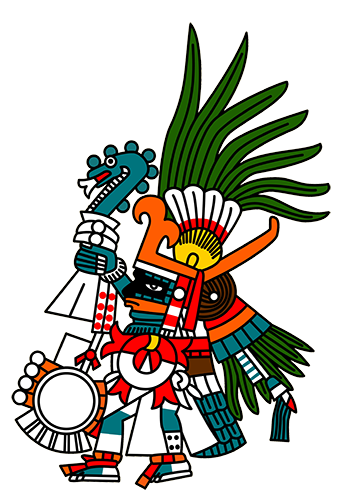He causes the walls of fire to fall down

Tepin hid with her children in her brother’s house and watched the enemy come.
Her sister-in-law was there too and the woman’s old mother. But Mazatl, himself, had been called upon to fight, which meant he was outside and probably already dead.
At least Tepin could tell her sister-in-law she couldn’t see his face on any of the warriors milling around the street.
“What do you see?” asked Yolotil, her brother’s wife, and Tepin leaned farther over the edge of the roof.
“The enemy are walking right into our trap,” Tried to sound confident. She didn’t like the size of the enemy cohort, nor the way they moved.
“Their feet strike the ground like a drum played by a single musician,” said Tepin. “They walk in lines like rows of corn. There are two sorts, I think. The ones in front have sword-clubs, but they’re made of silver. The ones behind carry spears, no, just staffs.”
“Are they warrior priests with ceremonial daggers and effigies,” wondered Yolil? “Do they think we’ll just bow to their display and let them take butterfly-prisoners?”
“They’ve pushed this far into the city,” said Tepin, “and killed everyone who’s resisted them. That’s why we’re breaking chivalry whith our ambush. They must have real weapons. I just don’t see them.”
She soon would, for someone screamed from the other end of the street, as high and fierce as that of a red-tailed hawk.
“Now!”
“The people of Cihuatlan rise from their ambush spots,” she said over the weeping of the children.
With efficiency and synchronicity almost beautiful in its perfection, half the enemy knelt and the other half raised their staffs.
“They run toward the enemy,” said Tepin. “Common warriors with arrows and atlatls, knights with sword-clubs and spears. Women with slings. Sticks. Rocks. Oh, praise the Hummingbird who causes the walls—”
Echos of thunder cracked against adobe and the warriors slammed backward in a spray of blood.
Tepin blinked. Squinted.
“What is it?” Yolotil’s hand was on her shoulder. “What happened? What was that noise?”
“I saw,” Tepin stammered, tried to make sense of it. “The earth cracked to swallow them. No. A thunderbolt struck them from the blue sky. No. Our warriors just…exploded.”
Just like Pochotl had said. Tepin wondered if she ought to feel worried about the man who’d brought this curse down on them.
“What’s happening now?” said Yolotil, holding back the children from the edge. “How many are dead?”
“Everyone. They’ve killed everyone.” The ones who hadn’t died in the thunder stood or ran or fought, and were hacked apart by those impossibly sharp silver swords.
“How is that possible?” creaked Tepin’s brother’s mother-in-law. “How can they take prisoners now? Who will they sacrifice in their home city?”
“This isn’t a flower war, mother,” said Yolotil. “It’s an anger war. A war of conquest”
Worse than that. Tepin believed this was hardly a war at all, but an extermination.
The poem paraphrased in the title




